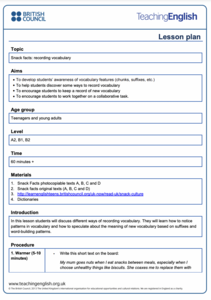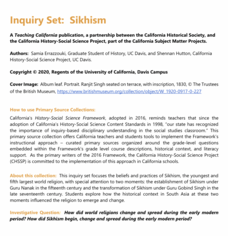British Council
How Green Are You?
Go green! Scholars survey their classmates to determine how green they are and then write a report to summarize their findings. Finally, pupils agree on five changes they can make in their lives to help the environment.
British Council
Rich!
Let's take a trip to the future. Scholars imagine their future wealthy selves by completing a worksheet based on the year 2025. Then, acting as journalists, they conduct interviews with their classmates to prepare to write an article for...
British Council
Litter Poem
What a load of rubbish! Using the resource, pupils listen to a poem about litter pollution and discuss the poem's language. After completing a worksheet about the poem, they write their own anti-litter poetry.
British Council
Forced to Wear a Skirt
What's the dress code? Scholars read brief texts about school uniforms and discuss opinions for and against them. Pupils then work with a partner to role play a conversation about school uniforms.
British Council
Card Games
Oh, snap! Learners practice conversational English by learning the rules of the card game Snap. Then, they play the game in small groups before writing out instructions for another card game of their choosing.
British Council
Reading House
Scholars work in pairs to describe their homes and draw a picture of their partner's home. Next, individuals discuss their ideal home in small groups and follow up their discussion with a written description.
British Council
Stairway to Nowhere (Lower Level)
Picture this! Scholars quickly sketch an image of what they think a picture of Stairway to Nowhere would look like. They participate in a fill-the-gap exercise where they complete sentences by filling in the blanks of the transcript as...
British Council
Dictionary Skills for Secondary Students
Pop quiz! Learners work in groups to answer questions on a quiz about dictionary skills. They then work to create a dictionary skill quiz of their own. Groups exchange quizzes and race to find all of the answers.
British Council
Snack Facts - Recording Vocabulary
What's in a word? Scholars look at a sentence written on the board about snacks. They discuss unfamiliar terms and then record the new words by drawing a picture, writing a synonym, writing a translation, or creating a mind map. Pupils...
British Council
Christmas
Pupils learn more vocabulary and English language by taking a close look at the words Happy Christmas and working in groups to see how many words they can make of the letters. Scholars then take a quiz to test their knowledge about...
University of California
Tenochtitlán
Behold, the Great Aztec empire! Scholars use primary sources to understand the impact of the Aztec city Tenochtitlan. Academics complete a worksheet and participate in group discussion to understand how Tenochtitlan was a melting pot for...
University of California
The Virgin of Guadalupe
A worldly resource focuses on the transfer of goods, ideas, and religion that took place as part of the Columbian exchange. Academics view sources such as text and artwork to help them complete a worksheet.
University of California
Sikhism
How does a new religion start? The informative resource highlights the Sikhism religion. Academics learn how the religion was created and spread throughout the ancient world. Scholars view a series of primary sources and complete a...
University of California
Was Slavery Always Racial?
The lesson focuses on slavery in the ancient world and asks academics to decide if it was always about race. Scholars view primary sources, participate in a short discussion, and complete a worksheet to understand how slavery in the...
University of California
Influences from South to Southeast Asia
In ancient times, people along trade routes exchanged ideas in addition to goods. Scholars view eight primary sources, such as artwork, to understand how India influenced southern Asia. Academics participate in a short group discussion...
University of California
The Mongol Empire
Scholars review eight sources to learn about the impact of the Mongol Empire and their leaders, such as Genghis Khan. Academics learn how the Mongols destroyed states but also increased connections with the rest of the world. To finish,...
University of California
Interactions in Baghdad and the Abbasid Caliphate
An interesting resource focuses on the cultures of different peoples that have lived in Baghdad and their interactions. Academics view 11 sources to understand how Baghdad has been home to people of many faiths and cultures throughout...
University of California
Bread and Circuses: Rome as a Site of Encounter
An intriguing lesson uses 12 Roman artifacts to explain Roman society and politics. Young historians view images of artifacts and learn how each one represents an aspect of Roman society. Academics also complete a hands-on activity to...
Franklin D. Roosevelt Presidential Library & Museum
Service Learning Projects
Service learning projects provide pupils an opportunity to put the theories they are learning about civics into practice. Scholars investigate the needs of their community and then adopt a project for them to become involved in.
Franklin D. Roosevelt Presidential Library & Museum
The Constitution
Three activities focus on the need to have rules. Young historians are first challenged to suggest rules for their classroom and then to create their own constitution that balances the need for freedoms and protections. The third...
Franklin D. Roosevelt Presidential Library & Museum
Developing Your Voice and Your Right to Free Speech
Three activities focus on the First Amendment, especially the freedom of speech. Scholars craft a letter to the President of the United States and express their views about a topic important to them. Another activity has participants...
Franklin D. Roosevelt Presidential Library & Museum
What Does It Mean to Be an American?
A series of four activities focuses young scholars' attention on what it means to be an American. They identify key qualities, values, and virtues they consider shared by Americans. Participants then pretend they have been selected to...
Franklin D. Roosevelt Presidential Library & Museum
Pearl Harbor Activity #7: Pop Up Video Activity
A pop-up video version of FDR's "Day of Infamy" speech engages scholars in depending their understanding of the attack on Pearl Harbor. After watching the video, class members select five new things that they learned and research how...
Franklin D. Roosevelt Presidential Library & Museum
Pearl Harbor Activity #6: December 7 and September 11 - Infamy Twins?
Why did attackers on December 7, 1941, and on September 11, 2001, choose the targets they did? That is one of several questions young historians try to answer as they compare and contrast the two attacks. They also consider the...

























